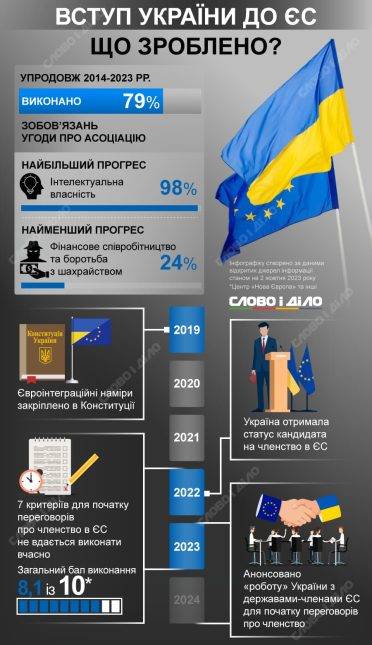
EU membership: what steps Ukraine has already made towards the goal
EU member countries could launch official negotiations on Ukraine’s membership as early as in December. The launch will be preceded by the presentation of a report on the fulfilment of seven recommendations. Deputy Prime Minister for European and Euro-Atlantic Integration of Ukraine Olha Stefanishyna believes that there is a general consensus regarding the negotiations, and the EU is already discussing the possibility of expanding the bloc to 36 countries and the changes required for that. “Slovo i Dilo” offers a summary of Ukraine’s current progress towards membership.

Ukraine’s path towards membership formally began with the signing of the Association Agreement with the European Union in 2014. As of today, Ukraine has completed 79% of the AA’s (Association Agreement) requirements. The most significant progress has been achieved in areas such as intellectual property (98%), statistics and information exchange (96%), and humanitarian policy (94%).
Ukraine has shown the least progress in the field of cooperation and the fight against fraud – only 24%. Notably, there has been zero progress in the Verkhovna Rada (Ukraine’s parliament), while the Cabinet of Ministers has achieved 25%. For example, the bills on “Amendments to the Criminal Code of Ukraine regarding responsibility for illegal actions with funds from the European Union budgets” and “Amendments to the Criminal Procedure Code of Ukraine regarding responsibility for illegal actions with funds from the European Union budgets” have been drafted, but not passed.
The requirements in the areas of transport infrastructure and postal services have been completed 55%. The progress in meeting this year’s tasks is 71%, but there is a risk that the government won’t be able to improve legislation on issues like vehicle certification, reduction of noise pollution from wheeled vehicles, ensuring the safety of two- or three-wheeled vehicles and quadricycles, and more in time. The Verkhovna Rada (VR) has completed 19% of its tasks, while the Cabinet of Ministers has achieved 58%.
Furthermore, 61% of the tasks regarding harmonization with the EU on customs issues have been completed. The Cabinet of Ministers has achieved 66% progress in this area, while the VR has reached 48%.
In 2019, Ukraine introduced the course towards EU and NATO membership to its Constitution and applied for candidate status for EU membership after the start of the full-scale war.Ukraine obtained the candidate status for EU membership in June 2022, along with seven recommendations, the fulfilment of which will determine the decision regarding the launch of the negotiations:
- Reform of the Constitutional Court
- Continuing judicial reform – the High Council of Justice and the High Qualification Commission of Judges
- Strengthening the fight against corruption
- Fight against money laundering
- Anti-oligarchic reform
- Adoption of media legislation
- Completion of legislative reform concerning national minorities.
The Cabinet of Ministers has stated that Ukraine won’t be able to fully meet all seven requirements in time, but Stefanishyna is confident that negotiations will start nonetheless.
Ukraine’s progress in fulfilling the recommendations can be assessed at 8.1 out of 10 points, according to the “New Europe” analytical centre. The most challenging criterion is the fight against money laundering.
On October 31, the European Commission is expected to release its report with an assessment of Ukraine’s progress. “Once the European Commission releases its report, we will need to work individually with the member states. At each step of the way, each member state can ask its own questions, which may not necessarily be related to the seven recommendations, to build consensus before December 2023,” said Stefanishyna.
As a reminder, “Slovo i Dilo” has gathered predictions from Ukrainian and European politicians regarding the time of Ukraine’s EU accession.
Media, Publications
-
Deputy Ambassador of the EU on enlargement, reforms and €190 billion in support
-
EU membership in 2030? Deputy Ambassador of the EU answers students’ questions
-
How does the EU take decisions on Ukraine? Subsidiarity, unanimity and consensus among 27 countries
-
What reforms does Ukraine still need to join the EU? Deputy Ambassador of the EU answers
-
How can Ukrainian students become more involved in EU programmes and projects? Deputy Head of the EU Delegation answers
-
Are there alternatives to European integration if the road to the EU is long? Deputy Ambassador of the EU answers